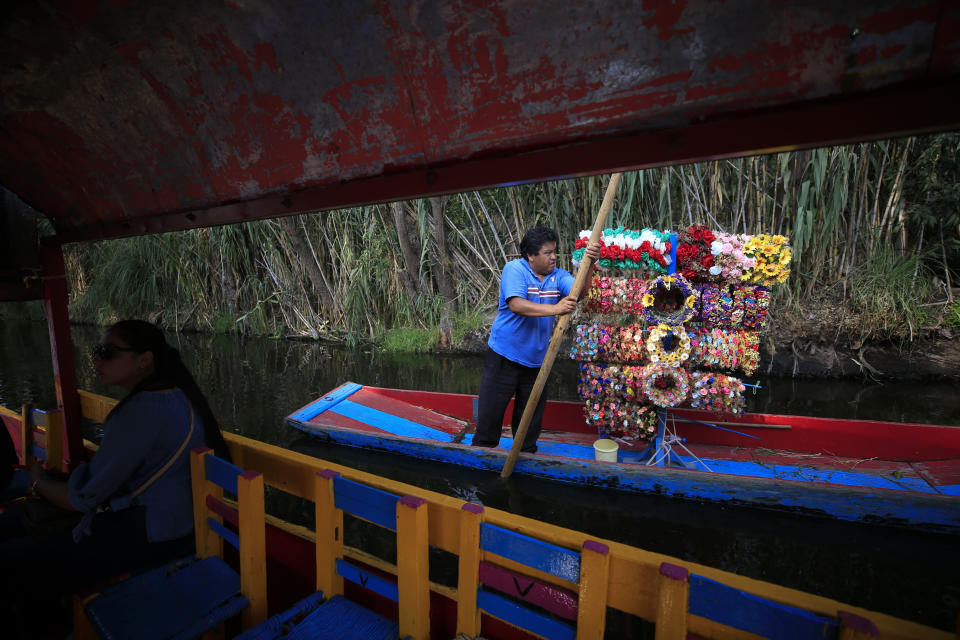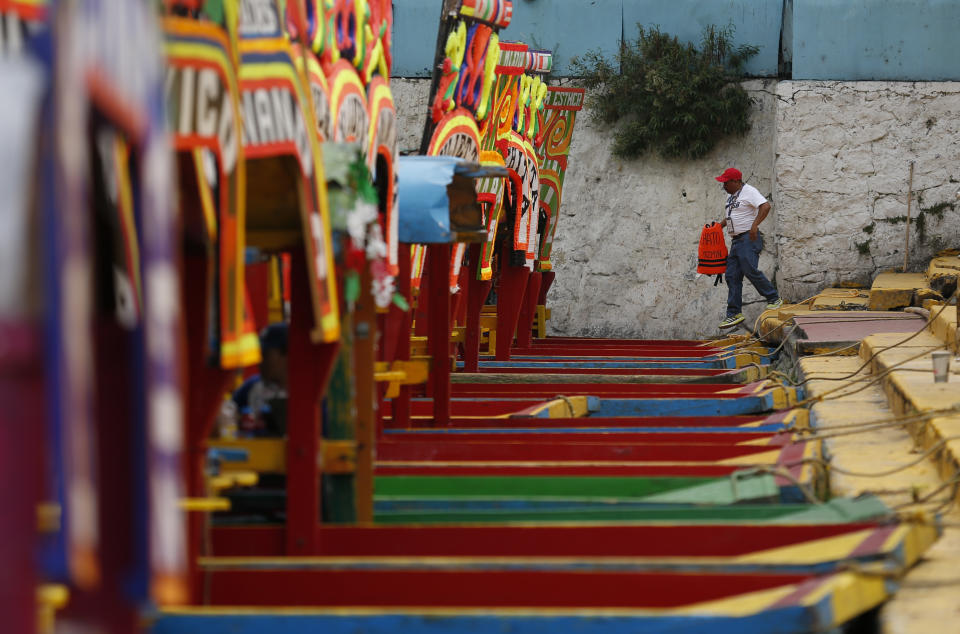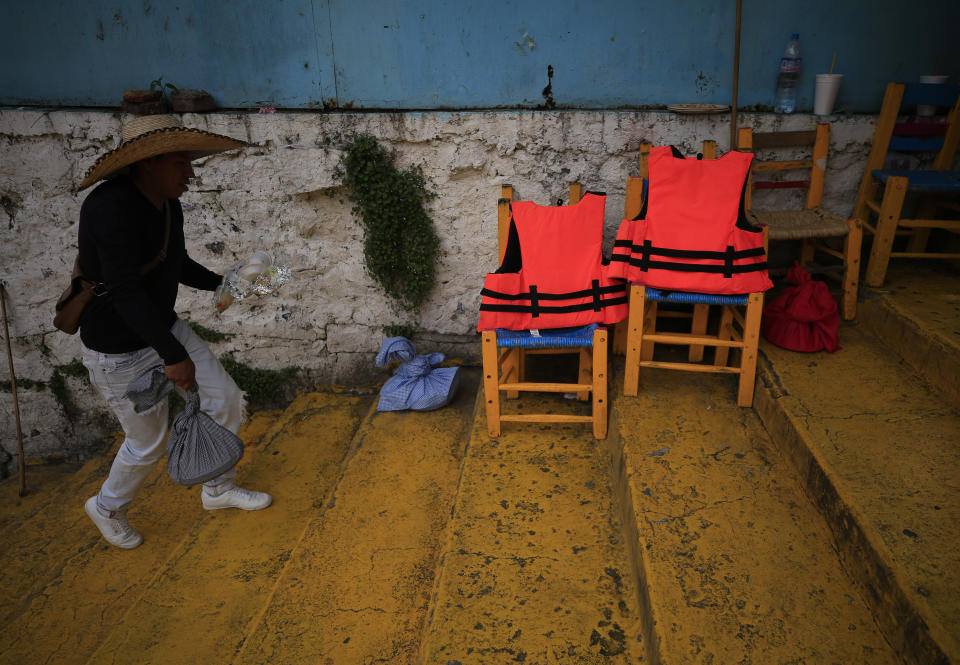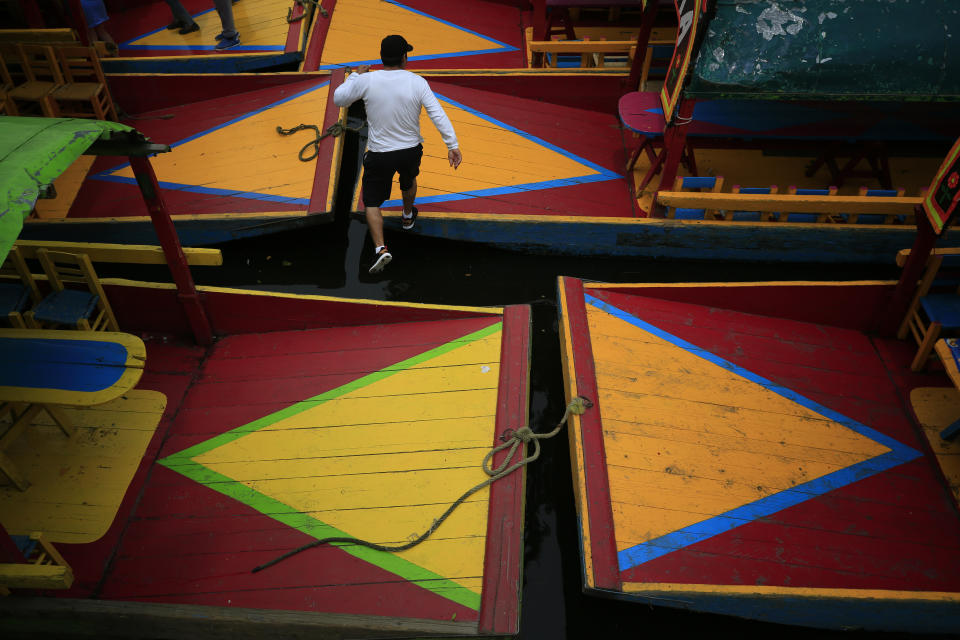After drowning, new rules, Mexico City canals see drop-off
MEXICO CITY (AP) — Dozens of brightly painted boats known as "trajineras" with names like "Victoria" and "Yolanda" idled at the Nativitas dock in Mexico City's famed Xochimilco canals, lashed together with thick ropes.
By this time on an early Friday evening, dozens of them should have launched with tourists and party groups, but instead the pole men who ply the calm, murky waters for about $25 an hour sat chatting. Some sipped tequila from plastic cups as they commiserated about how lousy business is these days.
"I haven't made any money in two days," said Jorge Alberto Velasco álvarez, who on a good day used to earn about $15-$20. "We need more people so we can work."
But the drowning last Sunday of a young passenger on a boat full of partiers prompted city officials to implement alcohol and other safety restrictions for the canals that took effect this weekend. At least so far, the new rules stand to have a dramatic impact on what is at times a party-hard atmosphere.
The new regulations include limits of one 1-liter bottle of hard alcohol per boat or three beers per person, and banning people from standing or jumping from boat to boat. Amplified music is prohibited in favor of mariachis and "norte?o" artists who perform for 150 pesos (about $7.50) a song. Boat capacity is capped at 18, and there is to be no roping of multiple vessels together while on the canals.
Officials say the aim is to encourage a more peaceful atmosphere for families and tourists and crack down on rowdy and dangerous behavior by those — particularly young people — who sometimes treat the trajineras like floating nightclubs, drinking to excess, dancing on tables and even brawling among themselves.
"This is going to be aimed directly at the young people," city tourism official Edilberto Ramírez Vázquez said.
He said about 400 city employees have been deployed to the various docks that feed the canals to enforce the rules.
Workers say business has fallen off by about 80% since the drowning, with some people perhaps unnerved by the accident and others put off by the anti-partying measures.
That is a blow to the livelihoods of thousands of boatmen, owners and those on the margins who sell tourists food, drink, flowers and trinkets.
"There are a lot of people hurting," said Luis Garcia, a 29-year-old who has been poling one of the estimated 1,200 trajineras in Xochimilco for a decade.
It's not the first deadly accident on the canals. At least six passengers have drowned in Xochimilco since 2005, according to a count by the newspaper Milenio.
But the latest one was caught on cellphone video: Two young men on a boat that launched from Nativitas try to step from one trajinera to another. One makes it and begins dancing on the platform, but there is a sudden splash and the other one is in the water. Workers try to rescue him, but he never surfaces.
Reportedly nicknamed "Chema," the young man was found the next morning floating over a half-mile (about 1 kilometer) away.
After the video caught fire online, borough officials called a news conference and announced the crackdown.
Under the new rules, boat owners will also be required to provide life jackets starting Oct. 1, though passengers can sign waivers not to use them. A handful of vests were draped over railings at the dock Friday, but not a single person was seen wearing one on the boats.
Enforcement seemed spotty. Some passengers said they weren't told about the new rules or offered life jackets. At least three trajineras cruised with music playing from stereos, though at moderate volume. There were no big groups of young people to be seen, despite it being a popular day and time for partiers.
"They probably have to get accustomed to the fact that this is going to be a different environment," said Sandra Barón, one of dozens of Xochimilco borough officials keeping an eye out for drunkenness and now-outlawed stereos.
"This is not a disco," she said from her vantage point on a bridge, flanked by a policeman. "It is a traditional atmosphere. That is what is trying to be recovered."
Workers were supportive of the goal of cracking down on young, hard-core partiers, derisively referred to as "juniors," who sometimes start throwing bottles in a drunken bacchanalia. But some also questioned the apparent emphasis on dockside controls.
"The problem isn't what we have here, the problem is out there. ... We want more police security," said Velasco álvarez, who would like to see at least five police boats with a half-dozen officers in each one, rather than the two boats currently deployed. "We are the ones who put ourselves at risk because it's just one of us (pole men) and they are 20 to a trajinera."
Others speculated it will be hard to enforce things like the alcohol limits, as partiers often buy bottles beforehand and bring them onboard in backpacks. Workers also wondered whether the borough's enforcers may vanish in a few weeks after the publicity around the drowning fades.
"I think the measures were a bit foolish," said Berenice del Monte, a 29-year-old beverage boat owner.
For now she has had to cut back staff from five to two because she cannot afford to pay everyone. She is no longer allowed to sell "caguamas," the Mexican equivalent of 40-ounce beers, or "micheladas," beery cocktails seasoned with tomato juice, lime and chili, served with salt around the rim.
Teresita Cortes Castillo, a 58-year-old Colombian tourist making her first visit to Mexico City along with her 15- and 21-year-old daughters, said she was all for attempts to limit alcohol consumption. Still, she was disappointed that the canals weren't more lively — or more sonorous.
"Look around, everything is so sad," Cortes said, gesturing at the handful of trajineras touring near hers. "It's a very happy culture, so the music is missing."
Finally a boat passed by with people singing along to a popular Mexican song playing from some sort of amplified system. Cortes knew the words and joined in, blowing a kiss and waving to the other boat.
"Viva Mexico!" a man called out to her. "Viva Colombia!" she shouted back.



















